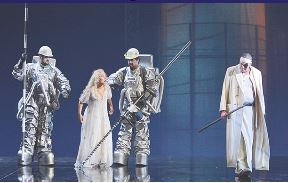1 Oct. – 17 Oct., 2015 –
 The 70th National Arts Festival by the Agency for Cultural Affairs presents:
The 70th National Arts Festival by the Agency for Cultural Affairs presents:
 Das Rheingold is Artistic Director IIMORI Taijiro’s first production for the second season. WAGNER spent 26 years of his life composing the four-part music drama, Der Ring des Nibelungen (The Ring of the Nibelung), and this work comprises the first part of it. The libretto, written by WAGNER himself, took its theme from the German Nibelungenlied (The Song of the Nibelungs)and Nordic myths.
Das Rheingold is Artistic Director IIMORI Taijiro’s first production for the second season. WAGNER spent 26 years of his life composing the four-part music drama, Der Ring des Nibelungen (The Ring of the Nibelung), and this work comprises the first part of it. The libretto, written by WAGNER himself, took its theme from the German Nibelungenlied (The Song of the Nibelungs)and Nordic myths.
The opera was directed by the internationally famous Götz FRIEDRICH, who was general director at the Deutsche Oper Berlin for nineteen years. This 1996 production is one from the last years of FRIEDRICH’s life, and was staged at the Finnish National Opera, Helsinki. The opera is sung by tried and true performers such as Jukka RASILAINEN, playing Wotan, and Stephen GOULD, playing Loge. It is conducted by Artistic Director of Opera, IIMORI Taijiro.
Staff
Conductor IIMORI Taijiro 1
Production Götz FRIEDRICH 2
Scenery and Costume Design Gottfried PILZ
Lighting Design Kimmo RUSKELA
 1 |
 2 |
Cast
Wotan Jukka RASILAINEN 3
Donner KURODA Hiroshi 4
Froh KATAYOSE Junya
Loge Stephen GOULD 5
Fasolt TSUMAYA Hidekazu 6
Fafner Christian HÜBNER 7
Alberich Thomas GAZHELI 8
Mime Andreas CONRAD 9
Fricka Simone SCHRÖDER 10
Freia ANDO Fumiko 11
Erda Christa MAYER 12
Woglinde MASUDA Noriko
Wellgunde IKEDA Kaori
Flosshilde SHIMIZU Kasumi
Orchestra Tokyo Philharmonic Orchestra
SYNOPSIS
Scene 1
The Rhinemaidens Woglinde, Wellgunde and Floßhilde are enjoying themselves in their element. Floßhilde is the only one who reminds them that they are actually guarding the Rhine gold. The Nibelung Alberich approaches the three maidens, full of longing for love and tenderness, but is scorned and rejected by them.
Alberich, between reeling with anger and swooning with increasing desire, has no idea of what he has seen when his eye is caught by the glint of gold in the light of the rising sun. But then Wellgunde reveals the deep, dark secret: anyone who fashions the gold into a ring will make himself ruler of the world, but only if he renounces love beforehand. Alberich has an outrageous idea: with such power he could perhaps not force somebody to love him but certainly to indulge his desires. He does what has previously been unthought of – he curses love and steals the gold.
Scene 2
Wotan has had the giants Fasolt and Fafner build the castle of Valhalla, from which he plans in future to order and rule the world. To pay for it he has promised to give the giants his sister-in-law Freia.
The castle is finished. Wotan attempts to stall the proceedings and calm his wife Fricka, who is worried about her sister. He has no intention of paying the price demanded. The giants insist that the contract should be honoured.
Loge, the God of Fire, whom Wotan has sent into the world to look for an equivalent form of payment instead of Freia, returns empty-handed. Nobody on earth can think of anything more valuable than happiness the love of a woman can give. Loge reports that he has heard of one person only, Alberich, who is said to have renounced love in order to forge a ring out of the Rhine gold. With the help of this ring he is said to have made himself ruler of his people, through whom he can get ever more gold from the depths, with the help of which Alberich seeks to rule the world.
The news about the gold and the ring arouses everyone’s interest. Fafner suggests a deal: Wotan should use Alberich’s gold as a ransom for Freia. The giants grant Wotan an extra day. As they leave with Freia as their hostage the Gods begin to wilt: it was the apples which Freia tended that had given them eternal youth. Wotan must act: accompanied by Loge he descends to Nibelheim.
Scene 3
Driven by Alberich’s brutality, the Nibelungs are extracting ever more gold and piling it up in a huge hoard. Alberich has had his brother Mime make a magic helmet, the wearer of which can assume any shape he chooses.
Alberich uses this invisibility to terrorize those he has subjugated. Wotan and Loge find Mime, who has been beaten and confides in the strangers, willingly revealing to them the secret of the helmet. Sure of his victory, Alberich tells the unbidden guests his plans for the future: he will seduce everybody with his gold and thus also conquer the gods.
Loge cunningly turns the conversation to the subject of the helmet. When he voices doubt about its powers, Alberich shows off by performing all his tricks: he first turns into a serpent, then into a toad. Wotan and Loge overpower him in this guise and abduct him from Nibelheim.
Scene 4
In order to buy his release, Alberich is forced to hand over the Nibelung hoard to Wotan. But Wotan is not satisfied with this and demands the ring as well. Alberich does not want to part with this at whatever cost and Wotan tears the ring from Alberich’s finger.
Once released, Alberich curses the ring: everyone will be envious of it and want to possess it, but instead of being of use to whoever possesses it, it will only bring sorrow, misfortune and death.
A space the height and width of Freia is measured out and the Nibelung hoard is piled up to match it, but the giants do not want to let Freia go until the ring is also in their possession. Urged on by the other gods Wotan refuses, but the wise old goddess Erda manifests herself out of the depths and appeals to his conscience: she warns him against the curse-laden ring and whispers secret things about an end in disaster. Disturbed by her appearance, Wotan hands over the ring and buys Freia’s freedom. Fafner quarrels with his brother about the ring and kills him.
Freia’s brothers Donner and Froh use magic to influence the weather and dispel the oppressive atmosphere. The gods enter Valhalla in a solemn procession. Loge prophesies their end in disaster. The Rhinemaidens can scarcely be heard as they call for justice from the depths.
The unsullied enchantment of E-flat major harmonies in the initial bars of Das Rheingolddoesn’t last very long. Instead, a world comes into being; a world that fifteen hours of music later will be unable to stave off its own downfall. In this world, nature is violated, and laws are ignored. Greed, power and malediction are the order of the day. Alberich steals the gold from the Rhine Maidens, enslaves his workers and revels in the sweet smell of world domination. Wotan claims it for himself and joins forces with Loge to make off with the ring, the gold and the magic helmet. His construction project is envisioned as the foundation of existence for his family of gods – his wife objects. He must part with the accursed ring as payment to the two giants. Seething with envy, one giant murders the other. The glow of the gods’ castle first gleams after the tempest, but Loge sees the castle already headed for ruin. The threads of the tale get tangled in this eve of the tetralogy, the water loses its sheen, and the clouds are shrouded in darkness.
http://www.nntt.jac.go.jp/english/




